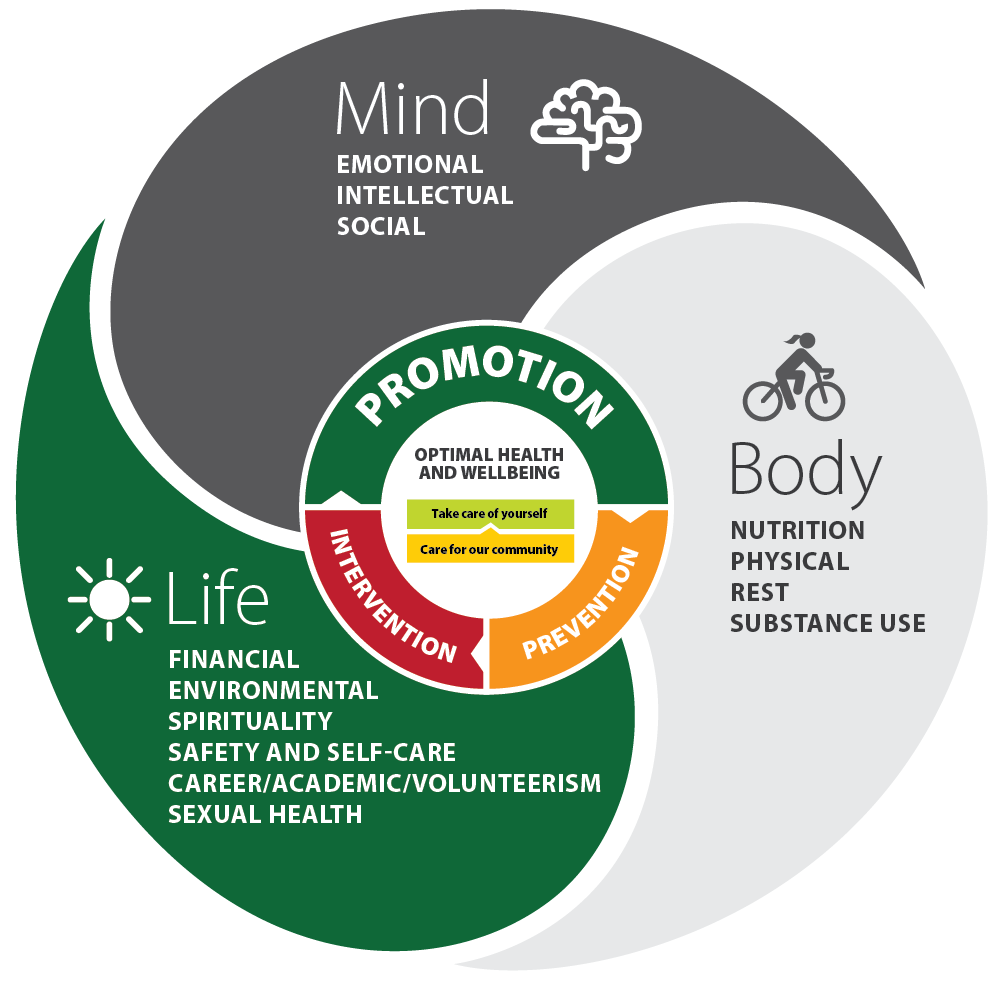USask Wellness Strategy
To create an environment that promotes and supports the health and well-being of all who study and work at our campuses.
Our Strategy
We will take a holistic approach to create a culture of wellness by engaging the university community—students, faculty and staff. It will take the entire university community to bring the strategy to life and make it sustainable for years to come.
While critical care will always be necessary, we will shift our core focus to promote wellness and strive to prevent illness.
Elements of Wellness

Healthy Mind

Healthy Body

Healthy Life
USask is committed to creating an inclusive wellness environment that supports our diverse students, faculty and staff. We will embed wellness in our institutional fabric, create opportunities to engage, ensure access to resources, supports and training and evaluate our progress over time.
We recognize the wholeness of a person's health is comprised of interdependent elements: mind, body and life. Therefore, the wellness strategy takes a holistic approach to being well in supporting three elements of wellness:
Healthy Mind
Provides the emotional energy and clarity to approach and manage life with optimism and resilience. A Healthy Mind contributes to the prevention or better management of mental illness.
Ways to nurture a healthy mind
- Social – establish positive, nurturing and healthy relationships and have a sense of community and belonging
- Emotional – be self-aware; accept and manage your feelings, thoughts, and attitudes; have self-esteem and be resilient.
- Intellectual – be open-minded to new ideas and experiences that allow you to have a growth mindset and continue learning.
Healthy Body
Provides the physical energy and endurance to fulfill life’s daily requirements and reach personal goals. A Healthy Body contributes to the prevention or better management of physical illness.
Ways to nurture a healthy body
- Nutrition – eat nutritiously with a focus on natural, unprocessed foods and a balanced intake of nutrients; following the recommended guidelines for health benefits.
- Rest – get sufficient amounts of rest, both during the day as well as sleep at night, to support the highest achievable quality of work and life.
- Substance use – limit, eliminate or be better informed about the use of substances - such as tobacco, alcohol, drugs, and others - on health and well-being.
- Physical activity – recognize the benefits and enjoyment of physical exercise/movement, and invest time in individual and group activities that build endurance, flexibility, and strength; follow the recommended guidelines for physical activity.
Healthy Life
Provides the knowledge, ability and opportunity to interact with the world with increased confidence, security and stewardship. A Healthy Life contributes to a Healthy Mind and Body.
Ways to nurture a healthy life
- Career/Academic/Volunteerism – seek personal fulfillment and meaningful work that nurtures your gifts, skills and talents while still maintaining a balance between work, study and personal leisure time.
- Environmental – relate to and care for the planet and nature.
- Financial – understand and manage money in ways that provide security, confidence and options to support work, study and personal commitments and interests now and in the future.
- Safety and care – safeguard yourself from physical or mental harm and practice methods of self-care that optimize well-being and prevent or better manage illness.
- Sexual health – choose a positive, respectful and safe approach to sexuality and sexual relationships; free of coercion, discrimination and violence. Empowerment and courage to speak out and seek help if needed.
- Spiritual – find peace, meaning and purpose in life, individually or through involvement with spiritual communities; appreciating connectedness between your inner world and larger expressions of reality.
It will take the entire university community to bring the strategy to life. We challenge each and every student, faculty member and staff member to commit to creating a culture of wellness and actively engage as a champion of wellness. There are many ways you can help create an environment that promotes and supports the health and well-being of our campus community.
There are many wellness opportunities already available to support your health and well-being at the U of S. Below are some of the opportunities and many of them would nurture one or all three elements of wellness:
Healthy Mind
- Board games at Louis' loft
- Mental Health Training
- Mental Health Awareness Week
- USSU Pride Centre
- USSU Women’s Centre
- Mindful Meditation
- Gordon Oakes Red Bear Student Centre
Healthy Body
- Yoga in the Bowl
- Student Wellness Centre
- Physical Activity Centre
- Farmer’s Market
- Edible Landscape and Community Gardening
- Campus Rec
Healthy Life
Areas of Support
The Wellness Strategy will focus on and provide resources in:
Promotion
Prevention
Intervention
Promotion
We will:
- Ensure a supportive foundation - ensure foundational supports (e.g. leadership support, policies, etc.) are in place to guide the development and practice of certain values, beliefs and behaviors that support various dimensions of wellness, and discourage those that do not.
- Foster a healthy culture and environment - focus on developing health promoting messages and networks, enhancing healthy spaces, and ensuring the U of S has a respectful, inclusive culture that reflects the values of the institution and the wellness needs of our community members.
- Raise awareness and maintain healthy behaviors - focus on engaging people in raising awareness, developing targeted communication plans and messages, improving access to health information and supporting change in behaviour.
Prevention
We will:
- Identify risk and respond early - educate all members of the U of S community to recognize early warning signs showing that a person may be struggling and require support, including indicators of more serious health risks.
-
Develop resilience and self-management competencies - empower people to take control of their wellness by developing coping skills to manage and/or overcome life’s demands, which decreases the risk of overall health issues.
Intervention
We will:
-
Provide services, training and critical support - offer services to support faculty, staff, and students in all aspects of their well-being. Additionally, support and training will be available for those people who are leading and/or supporting other people at the U of S, like those in advisory, faculty, managerial or other roles that have influence on others.
Wellness Framework
The U of S wellness framework reflects our holistic approach to being well in creating an environment that promotes and supports optimal health and well-being for all who work and study at our campuses.

The wellness framework is designed to:
- Highlight the university’s commitment to prioritizing our resources in wellness promotion, prevention and intervention.
- Illustrate the holistic approach to wellness and recognize the wholeness of a person is comprised of interdependent elements: mind, body and life.
- Identify the various dimensions such as emotional, physical and financial within mind, body, and life that affect overall health and well-being and remind us of the need to consider not only the interdependent parts but also their effect upon the whole.
- Highlight the role we all play in supporting and affecting our own wellness and that of those around us.
Okanagan Charter
The University of Saskatchewan has made a formal commitment to healthy minds, bodies and lives in the adoption of the Okanagan Charter, a global health initiative that calls on post-secondary institutions to make a commitment to embed health in all aspects of campus culture and take the lead in actions that promote well-being both locally and globally.
We value your feedback!
Your input is critical to supporting health and well-being at the USask.

